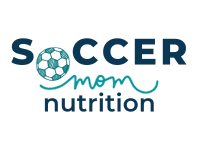Performance Nutrition-Guide to the Athlete’s Diet
Sports should be a fun and positive experience for youth and all athletes. Performance nutrition planning provides an important component in preparing them to perform optimally.
Done right, performance nutrition allows athletes to be focused, fueled and well hydrated during practices and competitions.
With so much information out there, you may wonder how to plan an athlete diet focused on sports performance.
While every athlete is unique, following some key principles for performance nutrition can help you develop good routines and habits that can be sustained and improved upon to reach optimal peak performance.
What impact does an athlete’s diet have on performance? Keep reading to learn more.
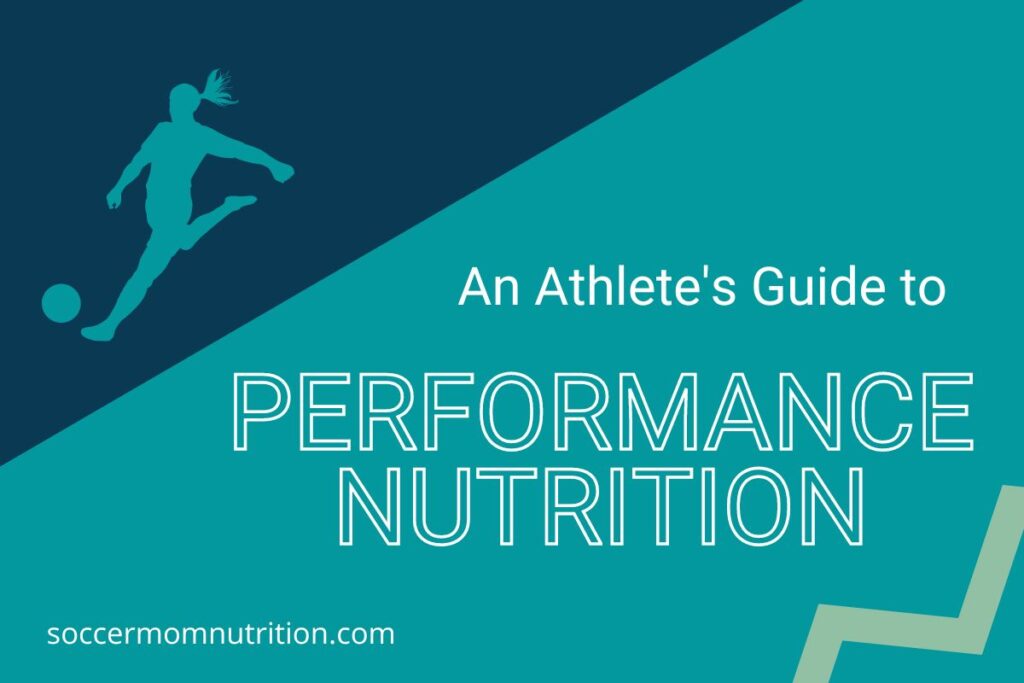
What is performance nutrition?
Performance nutrition is the practical application of proper hydration and fueling for exercise and recovery (1). When done correctly, an athlete can achieve optimal sports performance.
However, when not followed well, it can poorly impact performance and possibly cause injury.
Performance nutrition takes into account each athlete’s specific needs from body composition, position, playing time and sports specific needs. But, there are some basic principles that apply to every athlete.
The foundation of performance nutrition
Healthy eating and balanced nutrition are the foundation of performance nutrition. One day of healthy eating or one meal will not lead to peak performance.
Therefore, it’s critical to develop routines and an athlete diet plan for every day of the year whether you’re competing and recovering and when you’re in the off season.
The 3 primary principles of performance nutrition:
These performance nutrition principles can be individualized over time as you build habits and routines around the performance nutrition plan for your athlete diet.
However, the main principles of performance remain and should be integrated into an athlete’s diet plan (2):
- Staying well hydrated
- Fueling muscles for energy
- Promoting optimal recovery
Benefits of performance nutrition
The benefits of following a sports performance nutrition plan include:
- Maximizes performance
- Enables harder and longer duration for training
- Delays onset of fatigue
- Optimizes hydration to reduce risk of heat related illness
- Maintains concentration and focus
- Reduces risk of injury
- Enhances healthy immune system
- Promotes muscle growth adaptations to exercise
- Improve recovery and replenishment of nutrients and fluids
Build an athlete diet focused on performance nutrition
During the season athletes zero in on training, committing to hard work–pushing through grueling practices, weight room sessions and conditioning. Then in the off season your focus turns to working on tactics to prepare for the next season.
This might include building muscle, increasing speed and endurance or improving tactical skills.
But, not many athletes consider the performance nutrition aspect of preparing themselves for competition during the season and in the offseason.
Without an optimized performance nutrition plan, all your extra work and effort to build strength, conditioning and performance will be negatively impacted.
Goal setting for performance nutrition
Athletes, parents and coaches need to collaborate in setting goals for performance nutrition. The best laid plan falls by the wayside if the athlete doesn’t have access to the foods, drinks and nutrients they need.
This is especially true with traveling and tournaments when access to healthy foods may be more limited.
Setting goals for performance nutrition should take into account:
- Athlete’s mindset-performing at a high level requires athletes to consume enough high quality calories. Create a positive attitude towards fueling for sport by helping an athlete understand the benefits of performance nutrition.
- In season nutrition requirements. Are you practicing every day? How many games or competitions do you have a week? An athlete diet plan will take account all these factors to ensure you are well fueled, hydrated and have a solid recovery plan.
- Sport specific energy needs. This should include an understanding of the duration, frequency and intensity of activity required for your sport. In addition, consider factors like your position and playing time.
- Off season nutrition requirements. What are your goals for the off season? You may be looking to add muscle, lose weight or gain weight in order to perform at a high level in the next season.
Hydration for optimal performance
Hydration may be one of the most important elements of an athlete’s performance nutrition plan. About 60% of the body’s weight is water (3).
Athletes training at high intensity and especially for long durations lose water through sweat and breathing. If lost fluid is not replaced at strategic intervals across the duration of the activity, this can lead to dehydration.
Impact of poor hydration
An athlete who loses as little as 2% of total body weight may have a negative impact on performance. And without proper fluid replacement, you’re at risk for heat injury and exhaustion.
Much of this is due to a decrease in blood volume which reduces the amount of blood pumped from your heart and reduces the amount of oxygen getting to muscles,
Athlete hydration plan
Relying on thirst is not good practice as it is not an accurate indicator of fluid status. Often by the time you feel thirsty you may have already lost 1-2% of body weight.
Instead you should create a plan to ensure an optimal hydration status:
- Hydrate throughout the day, starting right when you wake up
- Start your activity well hydrated with 16-20 oz about 2 hours before
- Rehydrate throughout exercise with 3 to 6 gulps every 15 minutes
- Replenish full fluid and electrolyte needs as part of your recovery
Fluid replacement guidelines
Some athletes calculate their fluid replacement needs by calculating their sweat rate and determining how much fluid the need to replenish after exercise.
An easy way to determine fluid replacement is:
- Monitor fluid losses -weigh in before and after practice
- Replenish fluids based on weight lost – drink 20 oz (2-3 cups) for each pound lost
Macronutrient building blocks for performance nutrition
Carbohydrates
Carbohydrates are the preferred fuel source for high intensity intermittent and endurance activity.
Typically 50-60% of calories should come from whole grain, high fiber, quality carbohydrates, including gluten free carbs.
Good sources of carbohydrates include:
- Whole grain breads, cereals
- Pasta
- Rice
- Fruits
- Starchy vegetables
- Rice
- Potatoes
- Beans
- Milk and yogurt
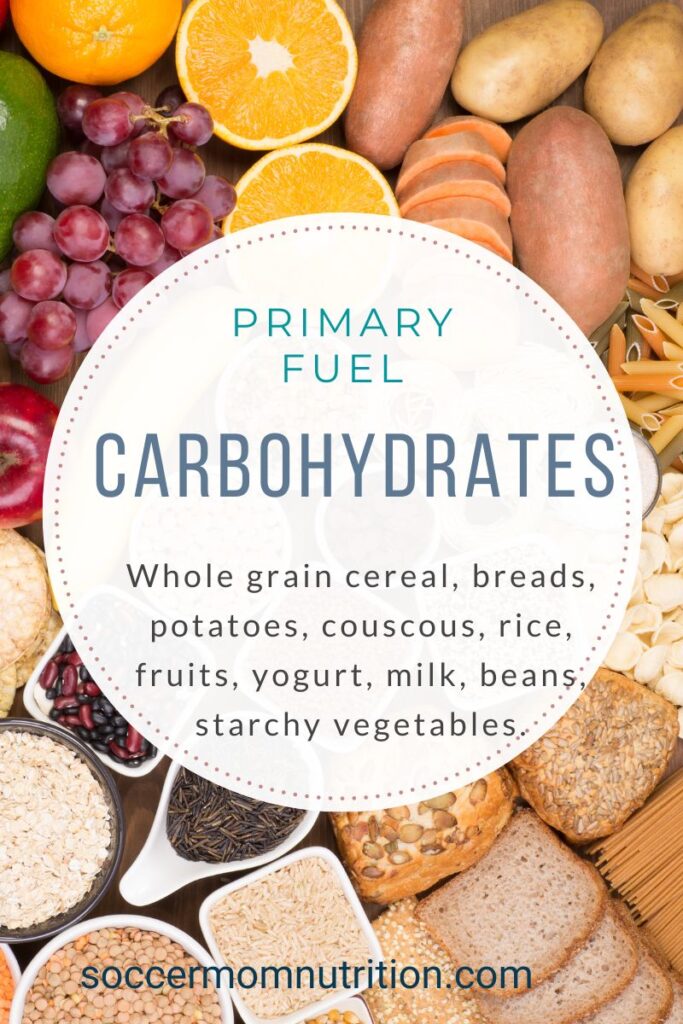
Protein
Protein’s role is to build and maintain muscle mass and aid in muscle recovery. You should eat a wide variety of high quality protein. Protein is not a primary fuel source.
Therefore, more protein does not mean more energy or bigger and stronger muscles.
As an athlete, you may have higher protein requirements but you’re likely getting enough protein in your diet. Around 15-20% of your calories should come from high quality and varied protein sources.
Good sources of protein include:
- Poultry
- Fish
- Lean meats
- Eggs
- Milk, yogurt, cheese
- Soy, tempeh, seitan
- Beans
- Nuts and seeds
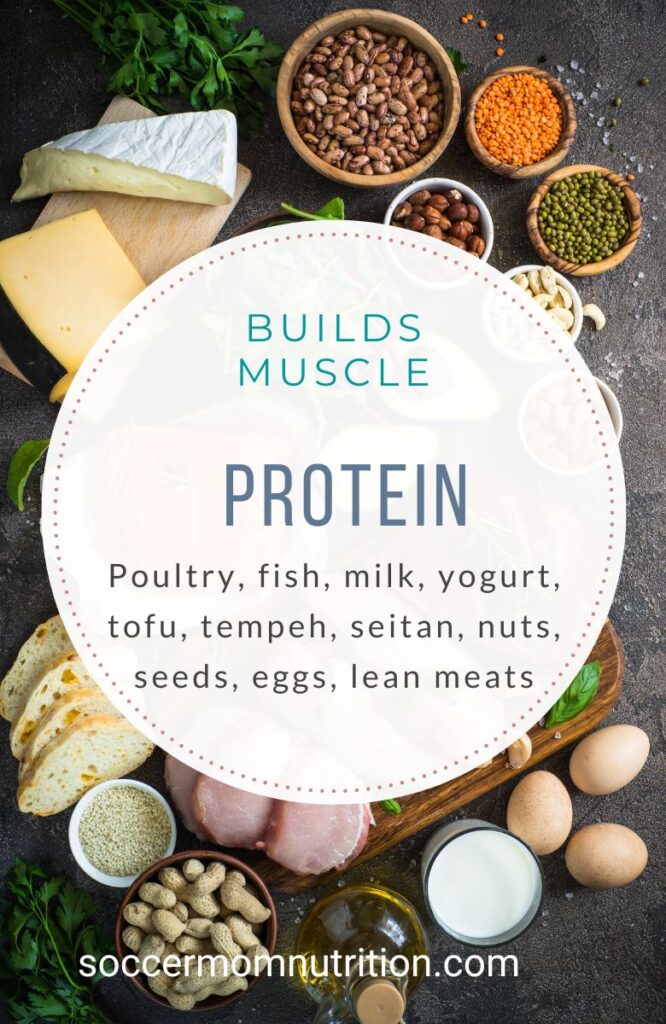
Fat
Fat is the primary fuel source of energy for light and moderate intensity exercise. For endurance events, fat can play an important role in fueling athletes when glycogen has been depleted and no additional carbohydrate has been ingested.
However, fat cannot be relied on for any power sports requiring quick bursts of energy. Fat also supports other functions in the body including aiding absorption of fat soluble vitamins and production of hormones.
You should aim for 20-30% of calories from fat with a focus on good sources of healthy fats and limiting saturated fats.
Good sources of fat include:
- Avocados and avocado oil
- Nuts and seeds
- Olives and olive oil
- Fatty fish like salmon
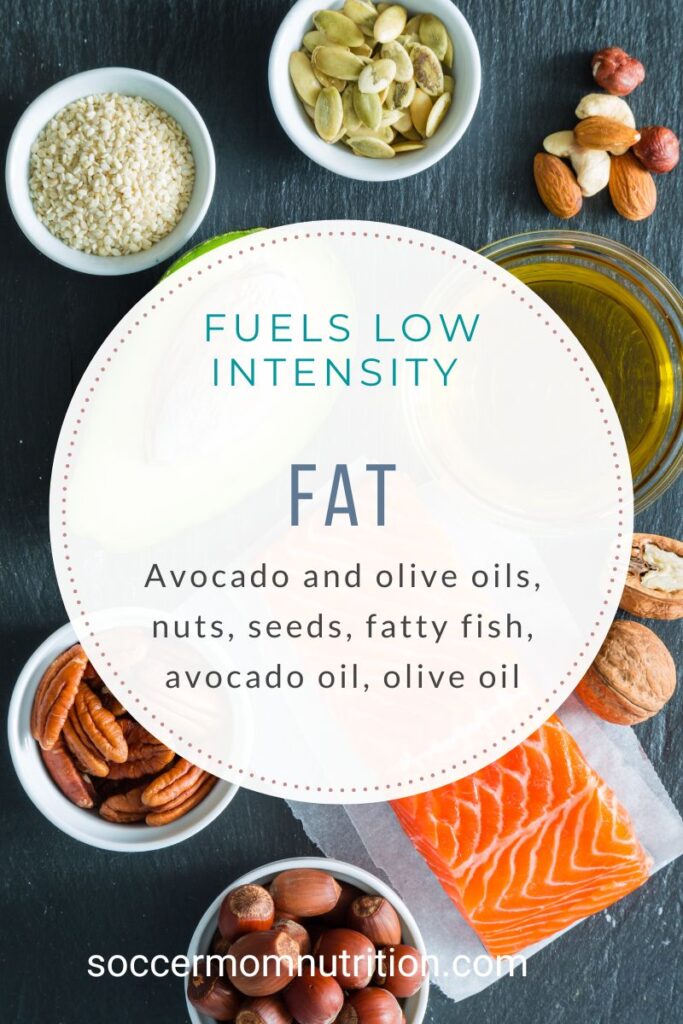

Micronutrient building blocks for performance nutrition
Vitamins
Vitamins A, C, D, E, K and the B vitamins support vital functions in the body. They protect from inflammation and cell damage caused by free radicals released during exercise (4).
B vitamins help your body turn carbohydrates into energy. And other vitamins play a role in bone growth and maintenance.
Most everyone can get the vitamins they need through eating a varied diet that includes foods from all food groups.
Athletes should always use caution when taking any vitamin supplement. You want to ensure it is third party tested and contains what it says it does.
Minerals
Minerals like calcium, sodium, iron, potassium, magnesium and zinc support multiple body systems including building bone and body processes like sweat production, urine output and supporting blood cells to transport oxygen.
As with vitamins, the best approach to getting meeting your body’s mineral requirements is to eat a varied diet with foods from all food groups.
Performance nutrition for in season
As with any plan, you will need to individualize these recommendations. It’s always recommended that you use practices and off days, or even the off season, to test out new foods and timing of ingestion.
Find what works for you and lock in that habit and routine.
Your calorie needs will likely be different in the off season if your activity has tapered. This will be addressed in future posts.
Timing and composition of what you eat for pre-competition meals, during competition and after your activity are the most important factors for achieving optimal performance.
Pre-competition meal and timing
Starting your day with breakfast is one of the most important habits to keep or start. Breakfast really is the most important meal of the day.
In general, the closer you get to competition or high intensity activity, the less you want to eat that will digest slowly and perhaps cause GI issues. You want to start most activity with an empty stomach but not feel hungry.
- Consume a substantial meal at least 3-4 hours before your event. This will allow you time to digest and absorb fill up your energy stores for the upcoming activity.
- Around 1-2 hours before, eat a high carbohydrate, easily digestible snack.
Pre-competition meal plans:
Morning event: Eat a substantial breakfast if you can. But if you’re starting pretty early, then try to eat some extra carbohydrates the night before. When you wake, eat a small, high carbohydrate and easily digestible snack. You may also want to opt for fluid based carbohydrates.
Mid-day/early afternoon event: Eat a substantial breakfast, then depending on the time, you may want to have a small meal with a mix of carbohydrate and protein, like a turkey sandwich, peanut butter and jelly or hummus and crackers.
If there’s not enough time in between the activity and breakfast, opt for an easily digestible high carbohydrate snack.
Late afternoon event: Eat a substantial breakfast, snack and lunch. Between lunch and the event, choose a high carbohydrate snack for quick fuel.
Evening event: Eat a substantial breakfast, lunch and snacks. If the event is in the late evening, use dinner time as your pre-game meal.
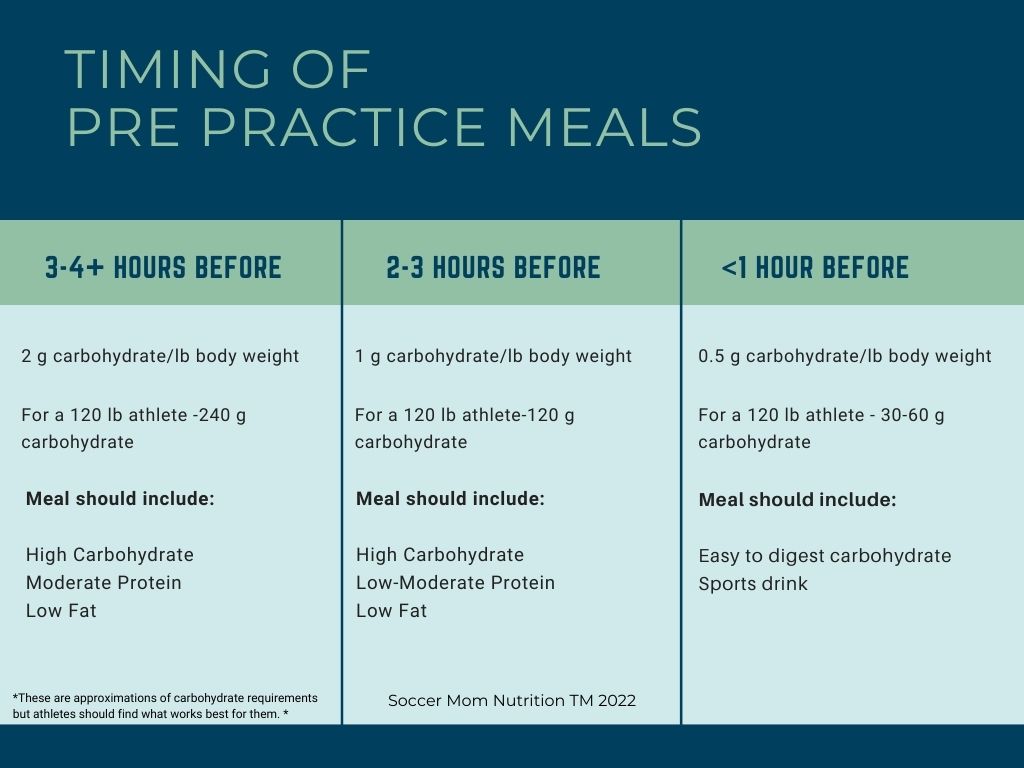
During competition food and timing
Eating during competitions lasting around an hour isn’t necessary. However, for activities lasting beyond an hour, you should ingest (either foods or sports drinks) around 30 – 60 grams of carbohydrate/hour.
- Sports drink: 2-4 gulps every 15-30 minutes of a 6-8% carbohydrate drink
- Easily digested, high carbohydrate: pretzels, applesauce, gummies, animal crackers
By this time your muscle and liver energy stores are depleted and you’ll need to get some quick calories to keep your energy high.
Post competition food and timing
During exercise your body uses up its energy stores and has lost fluid. You need to replenish these stores so you are ready for your next event.
Additionally, you want to maximize the adaptations from your activity so include a mix of carbohydrate and protein as your post fuel snack.
It usually takes around 24-36 hours to adequately replace the muscle carbohydrate that you used during exercise.
However, if you begin refueling with a ratio of 3:1 carbohydrate to protein and then eat a substantial meal within 2-4 hours, you can refill your energy stores much faster.
The four keys (4Rs) to performance nutrition recovery are:
- Refuel with 0.5 gram carbohydrate per pound of body weight
- Rebuild and repair muscles with at least 20-30 grams of high quality protein
- Replenish fluid and electrolyte stores
- Rest so that your body recovers and you’ll be ready for the next activity
Summary
Performance nutrition requires goal setting and then taking steps to build habits and routines.
Athletes need the support of parents, coaches and athletic trainers to support their goals and ensure they have access and time to eat foods to support their performance.
The foundation for performance nutrition is healthy eating. Therefore, beginning with building heathy habits including eating varied and balanced meals from all food groups will ensure you maintain good health and optimize your performance.
Check out our other posts for more detailed information related to performance nutrition so that you can perform your best.
Join our mailing list and get our FREE Pre-Activity Fueling Guide.
Stephanie Magill, MS, RD, CD, FAND has over 22 years of experience in public health and nutrition. As a performance registered dietitian nutritionist, Stephanie specializes in sports nutrition and provides simple and actionable information so that athletes can be well fueled for high performance on and off the field. Stephanie has a Master’s Degree in Nutrition and is a Fellow of the Academy of Nutrition and Dietetics.
